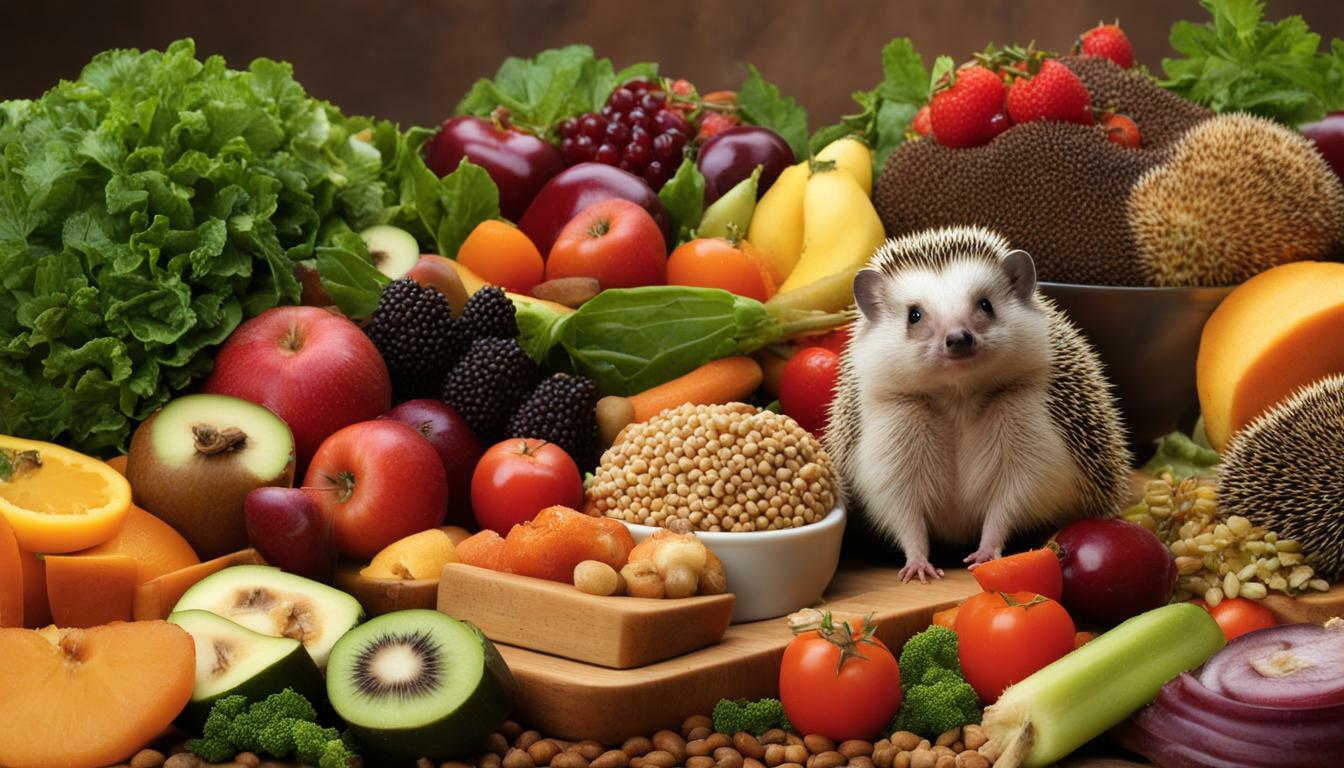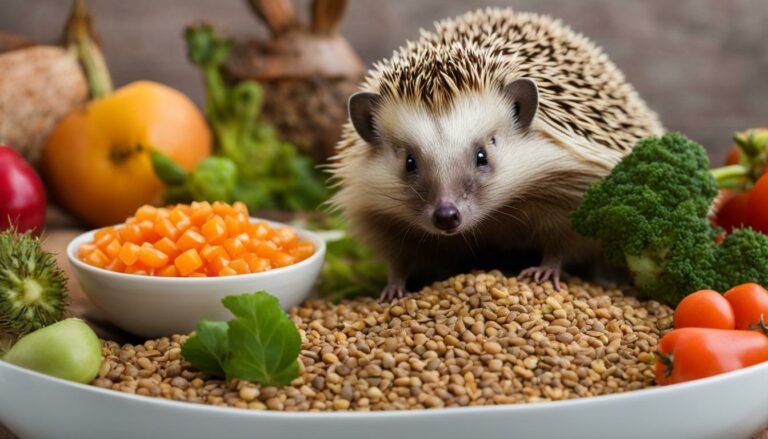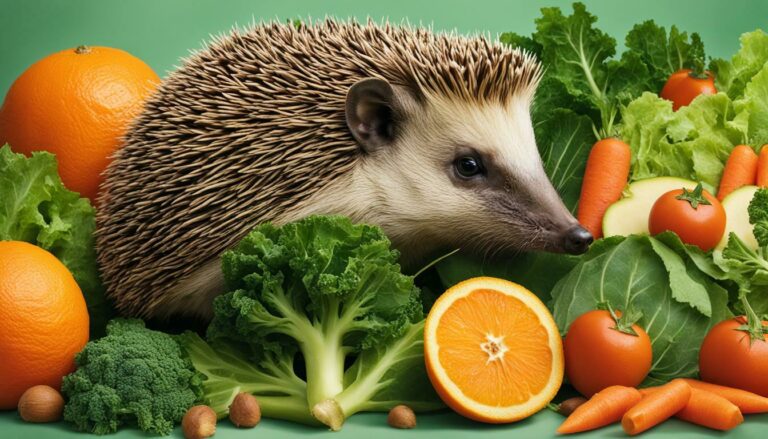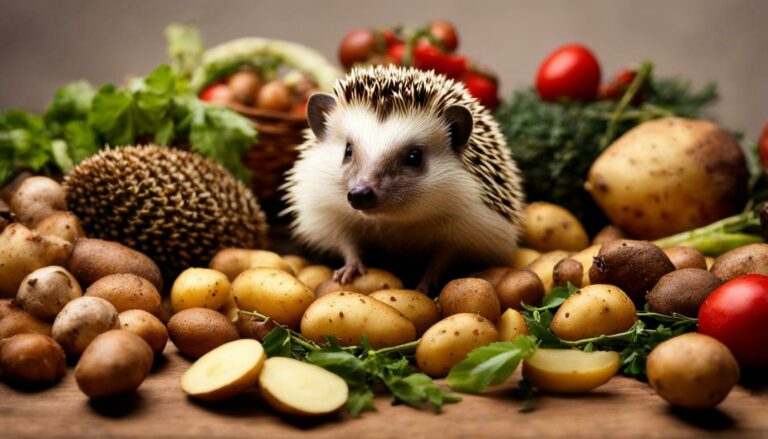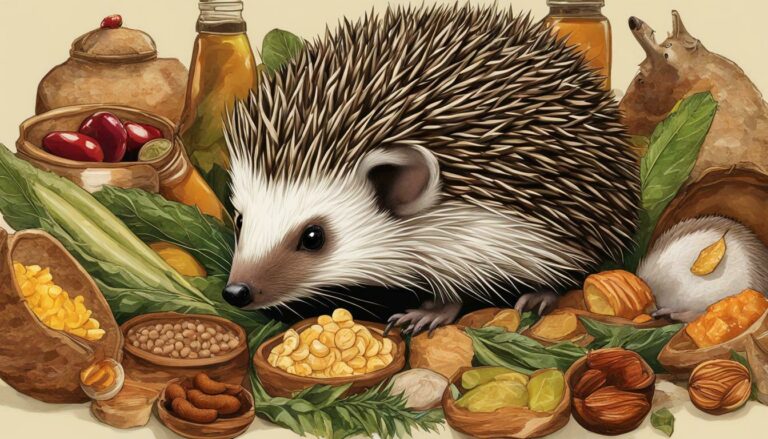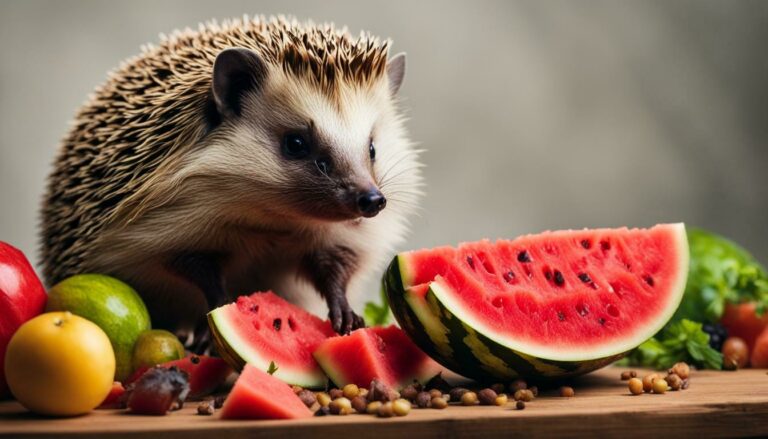Can Hedgehogs Eat Ferret Food? Facts and Guidelines
Hedgehogs have specific nutritional needs and it is important to understand if they can safely consume ferret food. While both hedgehogs and ferrets are omnivores, their dietary requirements and digestive systems differ. Therefore, it is crucial to provide hedgehogs with food that is specifically formulated to meet their unique nutritional needs.
Key Takeaways:
- Hedgehogs are omnivores and require a balanced diet of proteins, carbohydrates, vitamins, and minerals.
- Ferret food is typically higher in proteins and fats than what is optimal for hedgehogs.
- Hedgehog-specific diets are formulated to meet the nutritional needs of hedgehogs, with lower protein content and higher fiber.
- Feeding hedgehogs a diet of ferret food can lead to weight gain and health problems.
- It is best to stick with hedgehog-specific diets to ensure the health and well-being of your pet.
Understanding Hedgehog Dietary Requirements
Hedgehogs are omnivores and require a balanced diet of proteins, carbohydrates, vitamins, and minerals. In the wild, their diet consists of insects, slugs, snails, worms, eggs, and even small birds or rodents, along with fruits and vegetables. When it comes to choosing the right food for a pet hedgehog, it is important to ensure it contains all the necessary nutrients.
Hedgehog-specific diets are designed to meet the specific dietary needs of hedgehogs. These diets are lower in protein and higher in fiber compared to ferret food, which helps prevent weight gain and supports digestive health. They also contain the necessary vitamins and minerals to maintain a hedgehog’s overall well-being.
While some ferret foods may contain insects, they are usually not suitable for regular hedgehog consumption. Ferret food tends to be higher in protein and fat, which can lead to weight gain and health issues in hedgehogs. Furthermore, it may lack the essential vitamins and minerals that hedgehogs require.
Therefore, it is best to opt for hedgehog-specific diets that are formulated to provide the necessary nutrients for their optimum health. These diets come in various flavors and textures, ensuring a varied and balanced diet for your hedgehog.
| Pet Foods and Treats suitable for Hedgehogs |
|---|
| Cat food |
| Dog food |
| Baby food |
| Tuna cat food |
| Wet dog food |
| Fish cat food |
| Dry cat food |
| Pet Foods and Treats that should be avoided |
|---|
| Hamster food |
| Ferret food |
| Dog kibble |
| Rat food |
| Vegetarian cat food |
| Any cat food |
| Rabbit food |
Pet Treats suitable for Hedgehogs
- Kitten biscuits
- Cat biscuits
- Dog treats
- Cat treats
Pet Treats that Hedgehogs should avoid
- Dog biscuits
- Hamster treats
- Ferret treats
- Yogies
Exploring Hedgehog Food Options
Hedgehog owners have a variety of food options to choose from, including ready-made commercial food and homemade recipes. The key to providing a balanced diet for a hedgehog is to ensure that it contains the necessary vitamins, minerals, proteins, carbohydrates, and fiber.
Ready-made commercial food for hedgehogs is widely available in pet stores. These foods are specifically formulated to meet the nutritional needs of hedgehogs, with ingredients that provide the right balance of nutrients. They come in a variety of flavors and textures to keep the hedgehog interested and satisfied.
Alternatively, hedgehog owners can opt for homemade recipes to provide a more natural and customizable diet. Homemade hedgehog food can include a mix of proteins, such as cooked chicken or turkey, and fruits and vegetables, such as apples, carrots, and peas. It is important to ensure that the homemade diet is properly balanced and meets the hedgehog’s nutritional requirements.
Commercial Hedgehog Food Options
Here is a list of some popular commercial hedgehog food brands:
| Brand | Description |
|---|---|
| XYZ Hedgehog Food | This brand offers a variety of flavors and textures, with a focus on providing a balanced diet for hedgehogs. |
| ABC Hedgehog Food | This brand prides itself on using high-quality ingredients and providing a complete and nutritious diet for hedgehogs. |
| 123 Hedgehog Food | This brand offers a range of flavors and formulas to suit different hedgehog preferences and dietary needs. |
When choosing a commercial hedgehog food, it is important to look for one that has been formulated specifically for hedgehogs and has a good balance of proteins, carbohydrates, and fiber. It is also a good idea to consult with a veterinarian to ensure that the chosen brand meets the unique nutritional needs of your hedgehog.
The Importance of Proper Feeding Practices
Proper feeding practices are essential to ensure a hedgehog’s overall health and well-being. Hedgehogs have specific nutritional needs that must be met in order for them to thrive. By following the right feeding guidelines and making appropriate food choices, hedgehog owners can help their pets maintain a healthy weight, have good digestion, and receive all the necessary nutrients.
Choosing the Right Food
When it comes to hedgehog food recommendations, it is important to choose a diet that is specifically formulated for hedgehogs. Hedgehogs have unique dietary needs that differ from other animals, such as ferrets or dogs. While some ferret foods may contain insects, they are often higher in proteins and fats than what is optimal for hedgehogs. It is best to stick with hedgehog-specific diets that are balanced in terms of proteins, carbohydrates, vitamins, and minerals.
Additionally, hedgehog owners should avoid feeding their pets other types of pet food, such as cat or dog kibble. These foods may not provide the necessary nutrients for hedgehogs and can lead to health problems if given on a regular basis.
Proper Portion Sizes
Feeding hedgehogs the right amount of food is crucial for maintaining a healthy weight. Portion sizes should be appropriate for the hedgehog’s age, size, and activity level. It is recommended to consult with a veterinarian to determine the ideal daily caloric intake for the hedgehog. Gradual adjustments to the amount of food can be made based on the hedgehog’s individual needs.
Safe Food Choices
Feeding hedgehogs safe food is essential to prevent health issues. Hedgehogs should not be given raw meats, processed foods, foods with artificial ingredients or preservatives, or any type of animal products. These foods can be harmful to their digestive system and overall well-being. Instead, hedgehogs can be fed a variety of natural foods such as fruits, vegetables, and hedgehog-specific diets that provide the necessary nutrients for their optimal health.
| Safe Foods for Hedgehogs | Foods to Avoid for Hedgehogs |
|---|---|
|
|
In addition to choosing the right food, access to clean, freshwater should always be provided to hedgehogs. Clean water helps maintain hydration and supports overall health.
By following proper feeding practices and making informed food choices, hedgehog owners can ensure their pets receive the necessary nutrition for a happy and healthy life.
Understanding the Risks of Ferret Food for Hedgehogs
While ferret food may seem like a convenient option, it may not provide hedgehogs with the necessary nutrients and can lead to health problems. Hedgehogs have specific dietary needs that require a balanced mix of proteins, carbohydrates, vitamins, and minerals. Ferret food, on the other hand, is typically higher in proteins and fats, which can lead to weight gain and other health issues for hedgehogs.
One of the main concerns with feeding hedgehogs ferret food is that it may lack the necessary vitamins and minerals that hedgehogs need to stay healthy. Hedgehog-specific diets are formulated to meet their specific nutritional needs, including the right balance of nutrients and fiber to promote optimum health. Ferret food may not provide the same level of nutritional value, which can result in deficiencies and health complications.
Additionally, ferret food may not be as easily digestible for hedgehogs. While ferrets are carnivorous and can digest meat more efficiently, hedgehogs have a harder time digesting meat and require a diet that includes a mix of both plant and animal-based foods. Feeding hedgehogs a diet that is primarily or exclusively composed of ferret food can disrupt their digestion and lead to gastrointestinal problems.
It is important to prioritize hedgehog-specific diets that are specifically formulated to meet their unique nutritional needs. These diets provide the right balance of proteins, carbohydrates, vitamins, and minerals in quantities that are appropriate for hedgehogs. By choosing the right food for your hedgehog, you can ensure that they receive the necessary nutrients for their overall health and well-being.
| Foods to Avoid for Hedgehogs |
|---|
| Raw meats |
| Processed foods (like dog food) |
| Foods containing artificial ingredients |
| Foods that are too salty |
| Foods that contain preservatives |
| Any type of animal products |
In addition to avoiding ferret food, it is important to be aware of other pet foods that may not be suitable for hedgehogs. This includes dog food, cat food, and other types of pet food that may be high in fats, contain artificial ingredients, or lack the necessary nutrients for hedgehogs. It is best to stick to hedgehog-specific diets or consult with a veterinarian for recommendations on suitable food options for your pet.
Proper Feeding Practices for Hedgehogs
When it comes to feeding hedgehogs, it is important to establish proper feeding practices. This includes providing the right portion sizes and choosing safe food options. Hedgehogs should be fed a balanced diet that includes a mix of proteins, carbohydrates, vitamins, and minerals. It is important to adhere to the recommended portion sizes to prevent overfeeding, which can lead to obesity and other health issues.
Safe food choices for hedgehogs include high-quality proteins such as chicken, beef, lamb, or duck. These can be found in hedgehog-specific diets or in homemade recipes that include natural foods like fruits and vegetables. It is important to avoid feeding hedgehogs raw meats, processed foods, foods with artificial ingredients, foods that are too salty, foods with preservatives, and any type of animal products. These can be harmful to hedgehogs’ health and digestion.
Proper storage and handling of hedgehog food is also crucial to maintain its freshness and nutritional value. Hedgehog food should be stored in an airtight container at room temperature, away from heat sources. Moisture should be kept out of the container to prevent spoilage. It is recommended to check the expiration dates on packaged hedgehog food and discard any expired or spoiled food.
By following proper feeding practices and choosing the right food options for hedgehogs, you can ensure that they receive the necessary nutrients for their overall health and well-being. It is always best to consult with a veterinarian for specific dietary recommendations based on your hedgehog’s individual needs and health conditions.
| Foods Hedgehogs Can Eat | Foods Hedgehogs Should Avoid |
|---|---|
| Cat food | Raw meats |
| Dog food | Processed foods (like dog food) |
| Baby food | Foods containing artificial ingredients |
| Tuna cat food | Foods that are too salty |
| Wet dog food | Foods that contain preservatives |
| Fish cat food | Any type of animal products |
| Dry cat food | |
| Canned cat food |
Other Pet Foods to Avoid for Hedgehogs
In addition to ferret food, hedgehogs should also avoid consuming other types of pet food due to their high fat content and harmful ingredients. Hedgehogs have specific dietary needs that require a balanced mix of proteins, carbohydrates, vitamins, and minerals. Feeding them foods that are not specifically formulated for hedgehogs can lead to weight gain, digestive problems, and overall poor health.
Some pet foods that should be avoided for hedgehogs include:
- Rat food: Rat food is low in protein and not suitable for hedgehogs.
- Veterinarian cat food: These foods are usually based on corn and contain ingredients that hedgehogs cannot easily digest.
- Dog kibble: Dog kibble is not appropriate for hedgehogs as it is low in protein and comes in large chunks that may be difficult for them to chew and digest.
- Vegetarian cat food: Hedgehogs require a diet that includes animal proteins, so vegetarian cat food is not suitable for their nutritional needs.
It is important to read the nutritional labels and ingredient lists of pet foods before feeding them to hedgehogs. Look for foods that are specifically formulated for hedgehogs or consult with a veterinarian to ensure that the food you choose meets their dietary requirements. Providing a proper diet is crucial for the health and well-being of hedgehogs.
| Pet Foods and Treats | Hedgehogs Can Eat | Hedgehogs Should Avoid |
|---|---|---|
| Cat Food | ✔️ | ❌ |
| Dog Food | ✔️ | ❌ |
| Rat Food | ❌ | ✔️ |
| Vegetarian Cat Food | ❌ | ✔️ |
| Dog Kibble | ❌ | ✔️ |
Final Thoughts
Feeding hedgehogs a proper diet is essential for their overall health and well-being. In addition to avoiding ferret food, hedgehog owners should also avoid feeding them other types of pet food that do not meet their specific nutritional needs. By choosing foods that are formulated for hedgehogs and avoiding foods that are high in fat or contain harmful ingredients, hedgehog owners can ensure that their pets are receiving the nutrients they need to thrive.
Proper Storage and Handling of Hedgehog Food
Proper storage and handling of hedgehog food are crucial to ensure its quality and prevent spoilage. Hedgehogs have specific dietary requirements, and it is important to maintain the nutritional value of their food to support their overall health and well-being. Here are some guidelines to follow:
1. Choose the Right Food Container
Select an airtight container to store your hedgehog’s food. This will help to keep it fresh and protect it from moisture and pests. Ensure that the container has a tight-fitting lid to maintain the food’s quality.
2. Store in a Cool and Dry Place
Find a cool and dry location to store the hedgehog food. Heat and humidity can degrade the nutritional value of the food and make it more susceptible to spoilage. Avoid storing the food near sources of heat or in direct sunlight.
3. Keep Food Away from Contaminants
Prevent cross-contamination by storing the hedgehog’s food away from other pet foods or household chemicals. This will help to preserve its quality and prevent any potential health risks for your hedgehog.
4. Regularly Check for Expiry Dates
Always check the expiry dates on the packaging of the hedgehog food before purchasing or feeding it to your pet. Expired food can lose its nutritional value and may be harmful to your hedgehog’s health.
5. Monitor Food Consumption
Observe your hedgehog’s eating habits and adjust the portion sizes accordingly. Overfeeding can lead to obesity, while underfeeding can result in nutrient deficiencies. Regularly monitor your hedgehog’s weight and consult with a veterinarian for guidance on appropriate portion sizes.
| Foods to Avoid | Reasons |
|---|---|
| Raw meats | Can contain harmful bacteria and parasites |
| Processed foods (like dog food) | May not meet hedgehog’s nutritional needs |
| Foods containing artificial ingredients | Can be harmful to hedgehog’s health |
| Foods that are too salty | Can cause health issues |
| Foods that contain preservatives | May have negative effects on hedgehog’s health |
| Any type of animal products | Hedgehogs are not adapted to digest certain animal products |
By following these guidelines, you can ensure that your hedgehog’s food remains fresh and nutritious, supporting their overall health and well-being. Consult with a veterinarian for specific dietary recommendations and monitor your hedgehog’s weight and overall health to ensure they are thriving on their diet.
Conclusion
It is important to prioritize hedgehog-specific diets and avoid offering them ferret food to ensure their optimal health and well-being. Hedgehogs have specific nutritional needs that are best met through a balanced diet of proteins, carbohydrates, vitamins, and minerals. While ferret food may seem like a convenient option, it is typically higher in proteins and fats, which can lead to weight gain and health problems in hedgehogs.
Hedgehog-specific diets are formulated to provide the necessary nutrients in the right quantities for hedgehogs. These diets are lower in protein and higher in fiber, which helps prevent weight gain and supports digestive health. Additionally, they contain the essential vitamins and minerals that hedgehogs require for a healthy diet.
While some ferret foods may contain insects, which are suitable for hedgehogs, it is important to choose hedgehog-specific diets that provide a complete and balanced nutritional profile. These diets come in a variety of flavors and textures to keep hedgehogs engaged and prevent boredom with their food.
By prioritizing hedgehog-specific diets, hedgehog owners can ensure that their pets receive the nutrition they need to thrive. It is important to consult with a veterinarian or a hedgehog specialist to determine the best diet for individual hedgehogs based on their age, health, and specific needs. With proper nutrition, hedgehogs can live happy and healthy lives.
FAQ
Q: Can hedgehogs eat ferret food?
A: No, it is not recommended to feed hedgehogs ferret food. Ferret food is higher in proteins and fats, which can lead to weight gain and health problems for hedgehogs. Additionally, ferret food may lack the necessary vitamins and minerals that hedgehogs need in their diet.
Q: What should I feed my hedgehog?
A: Hedgehogs have specific dietary needs that should be met for their optimal health. A balanced diet for a hedgehog includes a mix of proteins, carbohydrates, vitamins, and minerals. Good options for hedgehog food include meat-based wet dog or cat foods, dry cat or kitten food, and homemade recipes.
Q: Can hedgehogs eat other types of pet food?
A: No, hedgehogs should not be fed other types of pet food such as dog kibble, hamster food, or rabbit food. These foods may not provide the necessary nutrients that hedgehogs need and can potentially cause health issues.
Q: How should I store my hedgehog’s food?
A: Hedgehog food should be stored in an airtight container to maintain its freshness and nutritional value. It should be kept away from heat sources and moisture to prevent spoilage. Check the expiry date and discard any food that has gone bad.
Q: What are the risks of feeding hedgehogs ferret food?
A: Feeding hedgehogs ferret food can lead to weight gain, health problems, and a lack of necessary vitamins and minerals in their diet. Ferret food is specifically formulated for the dietary needs of ferrets, which are different from hedgehogs.
Q: What are some other pet foods to avoid for hedgehogs?
A: Hedgehogs should not be fed pet foods such as rat food, bird food, or any food made for other animals. These foods may not provide the necessary nutrients for hedgehogs and can potentially cause health issues.
Q: How much food should I feed my hedgehog?
A: The amount of food to feed a hedgehog depends on factors such as their age, health, and previous diet. It is best to consult with a veterinarian to determine the appropriate portion sizes for your hedgehog.
Q: What is the best way to handle and store hedgehog food?
A: Hedgehog food should be stored in an airtight container at room temperature to maintain its freshness. It should be kept away from heat sources and moisture. When handling the food, make sure your hands are clean to prevent contamination.
